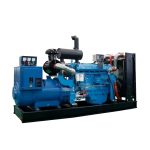Introduction
In today's modern world, the need for continuous power supply is more critical than ever. Many industries, businesses, hospitals, data centers, and even residential areas rely heavily on electricity to operate efficiently. However, power outages are a common occurrence due to various reasons such as natural disasters, equipment failures, or grid instability. To mitigate the impact of power disruptions, many organizations invest in backup power solutions like diesel generators for continuous monitoring.
Diesel generators have long been a popular choice for providing emergency power due to their reliability, efficiency, and cost-effectiveness. These generators are capable of supplying power for an extended period, making them ideal for continuous monitoring applications where uninterrupted power is essential. In this article, we will explore the importance of diesel generators for continuous monitoring and how they play a crucial role in ensuring a reliable power supply.
Importance of Continuous Monitoring

Continuous monitoring refers to the practice of constantly observing and analyzing a system or process to ensure its smooth operation. In various industries such as healthcare, manufacturing, telecommunications, and IT, continuous monitoring is essential to detect and address any issues promptly. Without continuous monitoring, organizations risk facing downtime, data loss, equipment damage, and potential safety hazards.
In today's digital age, many systems rely on electricity to function, and any disruption in power supply can have severe consequences. For instance, data centers store and process vast amounts of critical information that need to be constantly available. Any downtime in a data center can result in financial losses, reputational damage, and impact on customer service. Similarly, hospitals require uninterrupted power to operate life-saving equipment and maintain patient care. Continuous monitoring ensures that these critical systems are running smoothly and any issues are addressed promptly.
The Role of Diesel Generators in Continuous Monitoring
Diesel generators play a crucial role in providing backup power for continuous monitoring applications. These generators are designed to start automatically when the main power supply fails, ensuring a seamless transition to backup power. Diesel generators are known for their robustness, reliability, and ability to provide power for an extended period, making them ideal for continuous monitoring applications where uninterrupted power is essential.
Key Features of Diesel Generators for Continuous Monitoring
1. Reliability: Diesel generators are known for their reliability and durability. They are designed to start quickly and provide power within seconds of a power outage, ensuring minimal disruption to operations.
2. Fuel Efficiency: Diesel generators are more fuel-efficient compared to other types of generators, making them a cost-effective solution for continuous monitoring applications.
3. Extended Run Time: Diesel generators can run continuously for extended periods, making them ideal for applications where uninterrupted power is essential.
4. Remote Monitoring: Many modern diesel generators come equipped with remote monitoring capabilities, allowing operators to monitor the generator's performance, fuel levels, and maintenance requirements from a remote location.
5. Scalability: Diesel generators are available in various sizes and power capacities, making them suitable for a wide range of continuous monitoring applications, from small businesses to large industrial facilities.
Benefits of Using Diesel Generators for Continuous Monitoring
1. Uninterrupted Power Supply: Diesel generators ensure uninterrupted power supply during outages, ensuring that critical systems and processes remain operational.
2. Cost-Effectiveness: Diesel generators are a cost-effective solution for providing backup power, especially in applications where continuous monitoring is essential.
3. Quick Start-Up: Diesel generators start quickly and provide power within seconds, minimizing downtime and ensuring a seamless transition to backup power.
4. Low Maintenance: Diesel generators require minimal maintenance and are known for their durability, reducing the overall operational costs.
5. Environmental Considerations: While diesel generators produce emissions, modern diesel generators are designed to meet strict environmental regulations and emit lower levels of pollutants.
Case Studies: Real-World Applications of Diesel Generators for Continuous Monitoring
1. Healthcare Industry: Hospitals rely on continuous monitoring to ensure patient care and safety. Diesel generators are used to provide backup power to critical systems such as life-saving equipment, lighting, and HVAC systems during power outages. This ensures that medical facilities can continue to operate smoothly even in emergencies.
2. Data Centers: Data centers store and process vast amounts of critical information that need to be constantly available. Diesel generators are used to provide backup power to data centers, ensuring that servers, networking equipment, and cooling systems remain operational during power outages. This helps prevent data loss, downtime, and financial losses for businesses.
3. Telecommunications: Telecommunications providers rely on continuous monitoring to ensure that communication networks operate smoothly. 300kw generator are used to provide backup power to cell towers, data centers, and other critical infrastructure, ensuring that communication services remain operational during power outages. This helps maintain connectivity and ensures that emergency services can function effectively.
Conclusion
In conclusion, diesel generators play a crucial role in ensuring uninterrupted power supply for continuous monitoring applications. These generators are known for their reliability, efficiency, and cost-effectiveness, making them an ideal choice for industries and organizations that rely on continuous power to operate smoothly. By investing in diesel generators for continuous monitoring, businesses can mitigate the impact of power outages, reduce downtime, and ensure the safety and reliability of critical systems. Diesel generators are a valuable asset for any organization looking to maintain operational continuity and protect against the risks associated with power disruptions.
